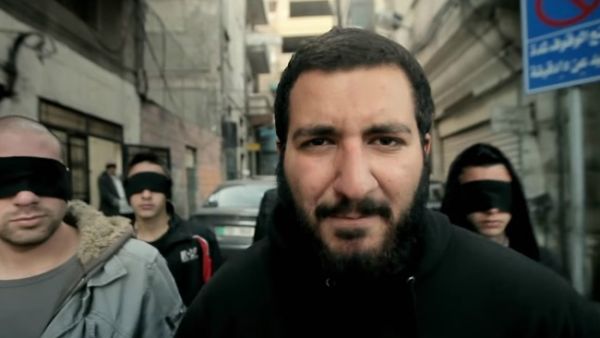Amman is quickly becoming one of the most interesting places to be in the Middle East right now, at least culturally. In a time when it seems like all eyes are on the region (or more eyes than usual, anyway), Amman has become a safe haven and a melting pot of different sensibilities and ideas.
Naturally, this has meant more art and more talent. Within this talent lies a community of hip-hop artists that rap about events in the region as well as issues they face more locally.
Here’s a list of hip-hop songs from local Jordanian talent that really resonate—locally and regionally.
# 1 — Amer AlTaher: ‘Makhnouu’ (Suffocated)
Amer immediately reels you in at the beginning of this record. Ten seconds in, the listener is submerged into a whirlwind of a frustrated artist who struggles with being able to express himself freely. Amer wants to speak to his community, but is uneasy due to the harsh judgment that his neighbors may place on him. For most Jordanians, hip-hop is new and probably uncomfortable. Amer is aware of this but towards the end of the record, it is apparent that his doubts don’t dictate his ambition and desire to express himself.
# 2 — Emsallam x Smokable: ‘Ghareeb’ (Strange)
Emsallam is in observance of what is around him on this record. He notices the changes that are taking place in his city. Jordanian society had gone through some major changes in recent years, and that’s lead to something of a culture shock for many. Emsallam expresses his nostalgia — a time when things were not so hectic in Amman…a time when someone like Emsallam was able to have some sort peace of mind.
The record was produced by Syrian artist Smokable.
# 3 — Torabyeh ft. Husam Abed: ‘Ghorbah’ (Foreignness)
This has to be by far the best music video produced by Jordanian hip-hop artists. The direction and footage are heavy on symbolism. The record itself represents a take on the Arab Spring and Palestinian-Israeli conflict from the perspective of Palestinian-Jordanians living in Amman. The hip-hop group Torabyeh is able to view the situations from a more stable environment, yet still frustrated as to what has been happening. It’s almost as if they feel like there is a constraint upon them that limits their ability to support their homeland. Besides that frustration at limitation, Torabyeh confronts the people within their own community that turn the other cheek in regards to the regional issues that are happening (the reason for the blindfolded individuals throughout the video).
Singer Husam Abed is featured on the chorus.
# 4 — U-Seff: ‘Hay 7aretna’ (Our Neighborhood)
A teenage U-Seff takes you to his neighborhood. This is a fresh perspective from a young Jordanian who wants you to see what it’s like inside his community. He manages to do this vocally and visually. Visually, the U-Seff captures the scenery of his neighborhood from rooftops to local buildings. It might not all be pleasant, but I think that is the point. He wants you to see that it’s not all pretty where he lives. It’s rWrough for a lot of Jordanians. Vocally, U-Seff is narrating what you see in the video. He describes why there is garbage in the street, and what happens you reach the roundabout. But in the second verse, something interesting happens. You hear U-Seff acknowledging that this is home, and it’s all he has ever known.
Overall, this record is really helpful if you want get an insight from the mind frame of Jordanian youth.
# 5 — Amer AlTaher: ‘Bassara’ (Vision)
The struggles that Jordanians face can often lead to confusion and anxiety. This bewilderment ultimately leads to questions. Amer makes this list twice because this record captures a feeling of hesitance that a lot of people in Amman go through. How does he do this? By telling a story of his encounter with a palm reader. Rather than just ask questions pertaining of to his own fortune and the future of his life, Amer shows concern for his community. In the third verse, Amer begins to express the familiar frustration that is heard frequently throughout his ‘360’ album.
Amer also shares his singing talents by performing on the chorus.
Written by Yazeed Makhlouf







